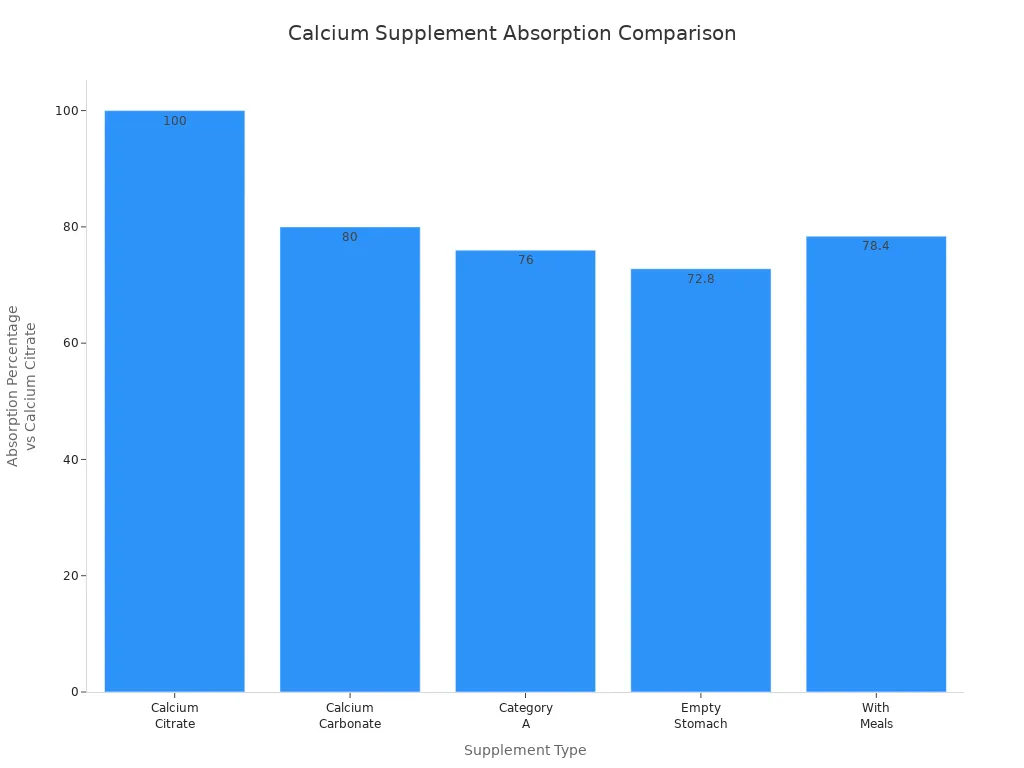How Calcium Citrate Acid Boosts Calcium Absorption
Table of Contents

You absorb calcium citrate acid more efficiently than other forms, even when you do not eat food. When you compare calcium intake from different supplements, calcium citrate acid stands out. Look at this table:
| Supplement Type | Absorption Percentage Compared to Calcium Citrate |
|---|---|
| Calcium Citrate | 100% (baseline) |
| Calcium Carbonate | 80% (20% lower absorption) |
| Category A | 76% (24% lower absorption) |
| Empty Stomach | 72.8% (27.2% lower absorption) |
| With Meals | 78.4% (21.6% lower absorption) |

You benefit from its unique solubility and independence from stomach acid. Many older adults experience low stomach acid, so calcium citrate acid helps them improve calcium intake and reduces side effects. You can trust this form for reliable calcium supplementation and better intake results.
- Seniors often have low stomach acid.
- Calcium citrate acid causes fewer gastrointestinal side effects.
- You find it suitable for calcium intake and supplementation.
What Is Calcium Citrate Acid?
Definition and Structure
You may wonder what makes calcium citrate different from other supplements. Calcium citrate is a compound made when calcium combines with citric acid. This form appears as a white, powdery substance. You find it in many calcium supplements at the store. The chemical formula for calcium citrate is Ca₃(C₆H₅O₇)₂·2H₂O. This means each molecule contains three calcium atoms, two citrate groups, and two water molecules.
Note: Calcium citrate dissolves better in water than some other forms. This property helps your body absorb it more easily.
You can see how calcium citrate compares to calcium carbonate in the table below:
| Property | Calcium Citrate | Calcium Carbonate |
|---|---|---|
| Chemical Formula | Ca₃(C₆H₅O₇)₂·2H₂O | CaCO₃ |
| Solubility | Sparingly soluble in water | More soluble in acidic conditions |
| Effect on Stomach Acid | No effect on stomach acid | Neutralizes stomach acid |
| Bioavailability | Comparable to calcium carbonate | Less bioavailable in some individuals |
| Risk of Acid Rebound | Lower risk | Higher risk |
How It Differs from Other Calcium Forms
You might notice that not all calcium supplements are the same. Calcium citrate stands apart because it does not need stomach acid for absorption. This makes it a good choice for people who have low stomach acid, such as older adults. In contrast, calcium carbonate needs acid to dissolve, so it works best when you take it with food.
Many studies show that the source and structure of calcium supplements matter. Most calcium carbonate comes from limestone or marble, which surprises many people. Calcium citrate, on the other hand, is a bulkier form and contains less elemental calcium per tablet. For example, 1,000 mg of calcium carbonate gives you 400 mg of elemental calcium, while 1,000 mg of calcium citrate gives you only 210 mg.
| Supplement Type | Elemental Calcium Content | Source |
|---|---|---|
| Calcium Carbonate | 40% | Derived from limestone, marble, or chalk |
| Calcium Citrate | 21% | Bulkier form of calcium |
Some research points out that all calcium salts, including calcium citrate, have similar absorption rates when you take them with food. Studies often report absorption rates between 23% and 37%. Marketing sometimes claims that one form is much better, but research shows that the real difference comes from how your body uses the calcium and what other nutrients you take with it. Studies also reveal that most people do not realize their supplements come from stone-like materials, which affects how they feel about taking them.
Tip: Always check the label to know what type of calcium you are taking. Research and studies can help you make the best choice for your health.
Calcium Absorption Science

How the Body Absorbs Calcium
You rely on two main pathways for calcium absorption in your body. The first pathway is active and depends on vitamin D. This process happens mostly in the duodenum, the first part of your small intestine. When your dietary calcium intake is low, your body uses this active pathway more. Vitamin D increases the number of calcium transport proteins in your intestine. These proteins help move calcium from your food into your bloodstream. The active process involves three steps. First, calcium crosses the brush-border membrane into the cells lining your intestine. Next, calcium moves through these cells with the help of special proteins. Finally, calcium exits the cells and enters your blood.
The second pathway is passive absorption. This process does not need vitamin D. It happens between the cells of your intestine and depends on how much calcium is present in your gut. When you eat a lot of calcium, this passive route becomes more important. Both pathways work together to keep your calcium homeostasis balanced. Your body adjusts the use of each pathway based on your needs.
Note: Calcium homeostasis means your body keeps calcium levels steady for healthy bones, muscles, and nerves.
You need both pathways to maintain calcium homeostasis. If your body cannot absorb enough calcium, you may face problems with bone strength and muscle function.
Role of Vitamin D
Vitamin D plays a key role in calcium absorption. Without enough vitamin D, your body can only absorb about 10% to 15% of the calcium you eat. When you have enough vitamin D, your absorption rate can rise to 30% or even 40%. Vitamin D helps by increasing the production of calcium transport proteins like TRPV6 and Calbindin 9k. These proteins help move calcium into and through your intestinal cells.
You need vitamin D to support calcium homeostasis. If you do not get enough vitamin D, your calcium absorption drops, and your body may take calcium from your bones to keep blood levels steady. This process can weaken your bones over time. Keeping your vitamin D levels healthy helps your body use calcium efficiently and supports overall calcium homeostasis.
Tip: Spend some time in sunlight or eat foods rich in vitamin D to help your body absorb calcium and maintain calcium homeostasis.
Benefits of Calcium Citrate Acid
Bioavailability and Solubility
You want your body to get the most from every dose of calcium. Calcium citrate acid stands out because it offers high bioavailability and excellent solubility. When you take calcium citrate acid, your body absorbs more calcium compared to other forms. This means you get more calcium into your bloodstream, which helps your bones stay strong and healthy.
Research shows that calcium citrate acid dissolves well in water. You do not need much stomach acid for absorption. This makes it a good choice for people who have low stomach acid, such as older adults. If you have achlorhydria, your body absorbs calcium citrate acid at a rate of 45%, while calcium carbonate only reaches 4%. You see a big difference in how much calcium your body can use.
Note: Good solubility means calcium citrate acid works for many people, even if your stomach does not make enough acid.
You can look at the table below to see how absorption rates change with different calcium sources and conditions:
| Study Category | Subjects | Calcium Source | Absorption Difference |
|---|---|---|---|
| Whole Set | 184 | Calcium Citrate vs. Calcium Carbonate | 20.0% higher |
| Category A | 71 | Calcium Citrate vs. Calcium Carbonate (empty stomach) | 27.2% higher |
| Category C | 65 | Calcium Citrate vs. Calcium Carbonate (with meals) | 21.6% higher |
You notice that calcium citrate acid gives you better absorption, especially when you do not eat food. This helps you get more calcium from your supplementation and supports your bone health.
Younger people absorb calcium at higher rates. Infants and young children can reach up to 60% absorption, while adults absorb only 15 to 20%. Your age affects how much calcium your body can use, so choosing a form with high bioavailability helps you maintain strong bones as you get older.
| Age Group | Absorption Rate |
|---|---|
| Infants and Young Children | Up to 60% |
| Adults | 15 to 20% |
You see that calcium citrate acid supports better calcium intake for all age groups. Good bioavailability means your bones get the calcium they need for growth and strength.
- Calcium citrate acid has better solubility than calcium carbonate.
- You need less gastric acid for absorption.
- People with low stomach acid benefit most from calcium citrate acid.
- Your body absorbs more calcium, which helps your bones stay healthy.
Absorption Without Food
You do not always want to take your calcium supplement with a meal. Calcium citrate acid gives you flexibility because your body absorbs it well, even on an empty stomach. You do not need to plan your calcium intake around food. This makes calcium supplementation easier and more convenient.
Clinical studies show that calcium citrate acid is absorbed 22-27% more than calcium carbonate, even in patients with achlorhydria or absorption disorders. You can see the results in the table below:
| Study Type | Findings | Conclusion |
|---|---|---|
| Meta-analysis of 15 studies | Calcium citrate absorbed 22-27% more than calcium carbonate | Calcium citrate is preferred for absorption, even in patients with achlorhydria and absorption disorders |
You get reliable calcium intake from calcium citrate acid, no matter when you take it. This helps you keep your bones strong and supports your overall health.
You may wonder about the long-term effects of calcium supplementation. Studies show that increased fasting calcium concentrations can lower your odds of longevity. Lifelong increases in calcium levels may raise your risk of cardiovascular disease. If you take more than 1,000 mg of supplemental calcium per day, you may increase your risk of death from cardiovascular diseases, especially among men.
| Finding | Outcome |
|---|---|
| Increased fasting S-Ca concentrations | Associated with lower odds of longevity |
| Genetically predicted lifelong increases of S-Ca | Increased risk of cardiovascular disease |
| Finding | Risk |
|---|---|
| Calcium supplements | Up to 30% increase risk for myocardial infarction |
| Supplemental calcium intake >1,000 mg/d | Raises risk of death from cardiovascular diseases among men |
You should talk to your doctor before starting calcium supplementation. You want to balance your calcium intake to support your bones without causing unwanted effects.
Tip: Take calcium citrate acid when you need it. You do not need to eat food first. Always check your total calcium intake and talk to your healthcare provider about your supplementation plan.
You see that calcium citrate acid gives you better absorption, high bioavailability, and flexibility for your supplementation routine. You support your bones and make calcium intake easier for yourself, especially if you have low stomach acid or want to take your supplement without food.
Calcium Citrate Acid vs. Calcium Carbonate

Absorption Rates
You want your body to get the most out of every calcium supplement. When you compare calcium citrate acid and calcium carbonate, you see important differences in how your body absorbs calcium. Some studies show that calcium carbonate powder can have higher bioavailability than calcium citrate tablets, especially if you take it with a light, low-calcium meal. In these cases, your blood calcium levels rise more after taking calcium carbonate. However, other research finds that calcium citrate works better for people who have had gastric bypass surgery. In these patients, calcium citrate lowers parathyroid hormone levels more and leads to higher calcium absorption. This means your body uses more of the calcium from calcium citrate in certain situations.
You also notice that calcium citrate acid does not need stomach acid to dissolve. This makes it a good choice if you have low stomach acid or take medications that reduce stomach acid. Clinical guidelines often recommend calcium citrate for people with absorption problems or special health needs. You get more reliable calcium absorption from calcium citrate acid if your stomach does not make enough acid.
Tolerance and Side Effects
You want your calcium supplementation to be safe and comfortable. Both calcium citrate and calcium carbonate can cause side effects, but you may notice some differences. Common side effects of calcium citrate include:
- Constipation
- Bloating
- Gas
Rarely, you might experience more serious effects, such as:
- Metabolic syndrome
- Kidney stones
- Gastrointestinal disease
- Heart disease
You should watch for unusual tiredness, weakness, increased urination or thirst, headache, muscle or bone pain, mood changes, weight loss, loss of appetite, vomiting, or nausea. If you notice these, talk to your doctor.
Calcium citrate acid usually causes fewer stomach problems than calcium carbonate. You may have less gas and constipation. The citrate in calcium citrate can also help prevent kidney stones by stopping stone formation. This makes calcium citrate acid a better choice for people at risk for kidney stones or those who have trouble with other supplements.
You may pay more for calcium citrate acid, but the benefits for absorption and fewer side effects can make it worth the cost, especially if you need reliable calcium supplementation.
Who Should Use Calcium Citrate Acid?
Low Stomach Acid
You may have low stomach acid if you are older or take certain medications. Your body needs acid to absorb some forms of calcium. Calcium citrate acid does not need much stomach acid, so you absorb it better. You may use medicines like H2-antagonists or proton pump inhibitors. These drugs lower your stomach acid. If you have achlorhydria or inflammatory bowel disease, your body struggles to absorb calcium from other supplements. Calcium citrate acid helps you get enough calcium even when your stomach acid is low.
You can see who benefits most from calcium citrate acid:
- Elderly people, especially those with osteopenia
- People with achlorhydria (low or no stomach acid)
- Individuals with inflammatory bowel disease
- People who use H2-antagonists or proton pump inhibitors
You may notice signs of calcium deficiency if your body cannot absorb enough calcium. Weak bones, muscle cramps, and tingling in your fingers are common symptoms. You can prevent deficiency by choosing the right supplement.
Tip: If you have low stomach acid, ask your doctor about calcium citrate acid. You may absorb more calcium and avoid deficiency.
Older Adults and Special Groups
You may need more calcium as you age. Your bones lose strength over time. Older adults often have lower stomach acid, so calcium citrate acid works well for them. You may have osteopenia, which means your bones are weaker than normal. Calcium citrate acid helps you maintain bone health and lowers your risk of deficiency.
Special groups also need to think about calcium supplementation. You may have a higher risk of calcium deficiency if you have certain health conditions. You should check for contraindications before you start taking calcium citrate acid. The table below shows when you should avoid this supplement:
| Contraindication | Description |
|---|---|
| Allergy | Do not take if allergic to calcium citrate or any ingredients in this drug. |
| Hypercalcemia | Avoid use in patients with high calcium levels. |
| Hypercalciuria | Avoid use in patients with high calcium in urine. |
| Renal Calculi | Contraindicated in patients with kidney stones. |
| Milk-alkali syndrome | Risk with very high, chronic dosing. |
| Pregnancy | Use with caution; benefits must outweigh risks. |
| Breastfeeding | Considered safe for use while breastfeeding. |
You should talk to your healthcare provider before starting any calcium supplement. You want to avoid problems and make sure you get enough calcium for your bones and muscles. Calcium citrate acid gives you better absorption and fewer side effects, especially if you belong to these special groups.
Calcium Supplementation Tips
Dosage and Timing
You want to get the most from your calcium supplementation. You should follow clear recommendations for calcium intake. Experts suggest you take no more than 500 to 600 milligrams of calcium at one time. Your body absorbs calcium better in smaller amounts. If you need more calcium, split your intake throughout the day. You can take calcium supplements in the morning and evening for steady absorption.
You find many forms of calcium citrate acid on the market. Each form supports different needs for calcium supplementation. Look at this table to compare popular sources:
| Form | Description |
|---|---|
| Calcium Citrate Anhydrous | Higher elemental calcium per unit weight, ideal for compact tablet/capsule designs. |
| Powder | Largest revenue generator, beneficial for long-term compliance due to stability and fast action. |
| Granular and Micronized | Supports specific processing needs in various applications, including nutraceuticals. |
You may choose a powder for easy mixing or a tablet for convenience. Your calcium intake depends on your chosen form and your daily routine.
Tip: Take calcium supplements with meals if possible. Dietary fat helps your body absorb calcium more efficiently.
Combining with Other Nutrients
You can boost your calcium absorption by combining calcium supplementation with other nutrients. Vitamin D plays a key role in calcium intake. You should pair calcium supplements with vitamin D for better results. You may get vitamin D from sunlight or fortified foods. You can also take a vitamin D supplement with your calcium.
You find new innovations in calcium supplementation. Nano-encapsulation and liposomal delivery systems improve calcium absorption and bioavailability. These sources help your body use calcium more effectively.
| Innovation Type | Description |
|---|---|
| Nano-encapsulation | Enhances absorption and efficacy of calcium citrate supplements. |
| Liposomal Delivery | Improves targeted delivery systems for better bioavailability. |
You should avoid high-oxalate and high-phytate foods when taking calcium. Foods like spinach and beans can block calcium absorption. You also want to limit caffeine intake, as high doses can reduce calcium intake.
Note: Spread your calcium supplementation across the day and combine it with vitamin D for best results. Avoid foods and drinks that lower calcium absorption.
You can follow these recommendations to improve your calcium intake and support your bones. Choose the right sources and forms for your needs. Adjust your supplementation routine for better health.
You see that calcium citrate acid offers superior absorption and flexibility for your calcium intake. The table below highlights its advantages over other forms:
| Metric | Calcium Citrate | Calcium Carbonate |
|---|---|---|
| Intestinal Calcium Absorption | 2.5-fold higher | Dependent on acid |
| Serum PTHmin | Lower | N/A |
| Urinary Calcium Increment | Greater | N/A |
You benefit from reliable calcium supplementation, whether you are elderly, active, or supporting a child’s growth. Healthcare providers recommend calcium citrate acid for those with low stomach acid and older adults. You should balance your calcium intake, focus on dietary sources, and consult your doctor for personalized advice.
FAQ
Can you take calcium citrate acid without food?
Yes, you can take calcium citrate acid without food. Your body absorbs it well on an empty stomach. You do not need to plan your supplement around meals.
Does calcium citrate acid cause stomach upset?
You usually experience fewer stomach problems with calcium citrate acid. Many people report less gas and constipation compared to other forms. You may feel more comfortable using this supplement.
How much calcium citrate acid should you take daily?
Most adults need 1,000 to 1,200 mg of calcium per day. You should not take more than 500 to 600 mg at one time. Split your dose for better absorption.
Can you combine calcium citrate acid with vitamin D?
You should combine calcium citrate acid with vitamin D. Vitamin D helps your body absorb calcium. You can get vitamin D from sunlight, food, or supplements.
Is calcium citrate acid safe for older adults?
Calcium citrate acid is safe for older adults. You absorb it well even if you have low stomach acid. Many doctors recommend it for seniors who need reliable calcium intake.

Poseidon
Master of Nutritional Epidemiology, University of Copenhagen, Herbal Functional Nutrition Researcher
Focus: The scientific application of natural active ingredients such as Tongo Ali, Horny Goat Weed, and Maca to sexual health and metabolic regulation.
Core Focus:
Men: Use a combination of Tongo Ali (an energizing factor) + Maca (an energy reserve) to improve low energy and fluctuating libido.
Women: Use a combination of Horny Goat Weed (a gentle regulator) + Maca (a nutritional synergist) to alleviate low libido and hormonal imbalances.
Stressed/Middle-Aged Adults: This triple-ingredient synergy supports metabolism, physical strength, and intimacy.
Product Concept:
Based on traditional applications and modern research (e.g., Tongo Ali promotes testosterone-enhancing enzyme activity, and icariin provides gentle regulation), we preserve core active ingredients and eschew conceptual packaging—using natural ingredients to address specific needs.
Simply put: I'm a nutritionist who understands "herbal actives." I use scientifically proven ingredients like Tongo Ali, Epimedium, and Maca to help you make "sexual health" and "nutritional support" a daily routine.
